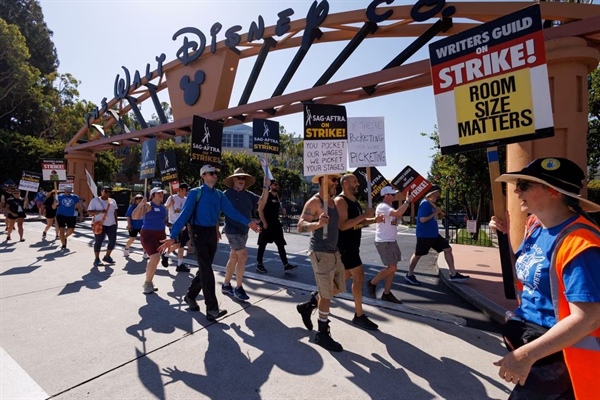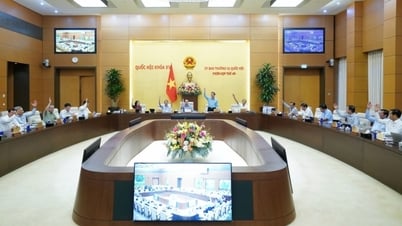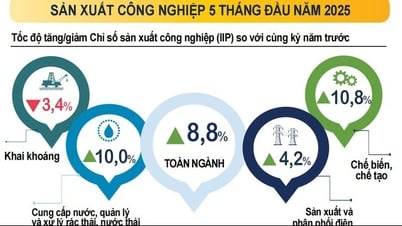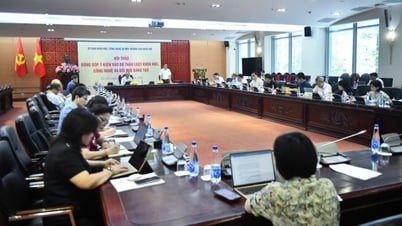
Actors and writers from the Writers Guild of America walk along the fence outside Disney Studios in Burbank, California (USA) Photo: REUTERS
According to Reuters, the Writers Guild of America and the Alliance of Motion Picture and Television Producers (AMPTP) - an organization representing major producers such as Walt Disney, Netflix and other media companies - held their first talks after about a month of stalemate. However, after three consecutive days of meetings, Hollywood screenwriters and top US studio executives have not found a solution to end this nearly 150-day strike.
Walt Disney Chairman and CEO Bob Iger and Netflix CEO Ted Sarandos, along with Warner Bros. Discovery CEO David Zaslav and Comcast's NBCUniversal Studios President Donna Langley, have been engaged in talks with the Writers Guild of America (WGA). While the two sides met, union members massed outside the studios at the urging of WGA negotiators to exert pressure outside the studios. Among the crowd outside Netflix was Matthew Weiner, creator and writer of Mad Men. Matthew Weiner expressed optimism that the recent talks marked progress. "I'm hopeful," he said. "I want to get back to work and I want to start repairing these relationships." Producer and WGA member Al Septien also protested outside Netflix on Friday, saying he wanted to return to work, but only under the right conditions. “We've been here a long time. We don't want to settle for anything less than a fair and good deal for the writers,” he said.
It’s not been since 1960 that both the Writers Guild and the Actors Guild have gone on strike at the same time, and they’ve also had a common opponent, the Alliance of Motion Picture and Television Producers. It’s about pay and working conditions in an age of streaming and declining TV revenue.
When Hollywood celebrities show up to the strike, it’s because they believe the Screen Actors Guild needs a fairer contract, one that eliminates underpayment, reduces headcount, reduces repurposing, and addresses a number of other issues, including tighter controls on the use of artificial intelligence (AI). “The money the production companies make in one night could feed all these people who are out here for years,” said Evan Shafran, a member of the Screen Actors Guild. “They make a lot of money.”
Earlier, on May 2, about 11,500 Hollywood screenwriters went on strike to demand fairer wages. According to CNBC, this was the industry's first strike in the streaming era and it directly affected many companies in three different areas of media business activities such as cinema, linear television and streaming.
The Writers Guild of America (WGA) is seeking higher pay, especially for writers on streaming shows, as well as new rules that would require producers to use a certain number of writers for a specific period of time. The WGA is also looking to help its members receive compensation throughout pre-production, production, and post-production. This is because writers are often asked to provide revisions or create new material without being paid. The WGA’s demands also relate to the role of artificial intelligence (AI), among other issues.
Other Hollywood organizations including the Alliance of Motion Picture and Television Producers, the International Alliance of Theatrical Stage Employees (IATSE) and the Teamsters have also called for strikes while issuing statements about their negotiating positions.
On July 13, leaders of the Hollywood actors’ union voted to engage in the first joint strike with writers since 1960 after contract negotiations with studios and streaming services collapsed. It is the first time the two major Hollywood unions representing actors and writers have gone on strike at the same time since 1960. No negotiations are currently scheduled between actors and studios. The union cited modest income streams but inflationary equipment and the streaming ecosystem, as well as the threat of unregulated AI, among other reasons for the actors’ decision to strike.
The Hollywood actors' strike comes amid the expiration of a three-year contract and the breakdown of negotiations between the Screen Actors Guild - American Federation of Television and Radio Artists (SAG - AFTRA) and the Alliance of Motion Picture and Television Producers (AMPTP).
HAPPY
Source

























































































![[OCOP REVIEW] Tu Duyen Syrup - The essence of herbs from the mountains and forests of Nhu Thanh](https://vphoto.vietnam.vn/thumb/402x226/vietnam/resource/IMAGE/2025/6/5/58ca32fce4ec44039e444fbfae7e75ec)







Comment (0)